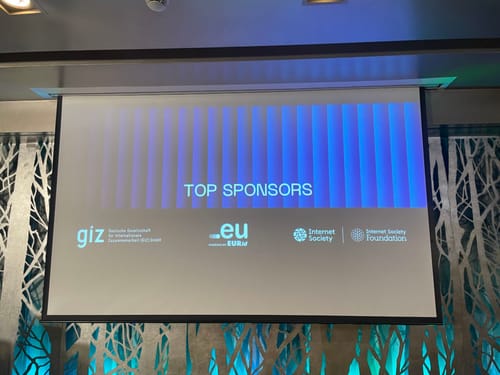
SEEDIG 10: Innovation without Sovereignty is Not Progress
ISOC Switzerland Chapter - Monday, November 3, 2025The 10th edition of the South Eastern European Dialogue on Internet Governance (SEEDIG 10) convened in Athens under the theme “A Decade of Dialogue and Cooperation: What’s Next?”

The event brought together policymakers, regulators, academics, civil-society representatives, technical experts, private-sector leaders, and youth delegates from across South Eastern Europe to reflect on a decade of digital transformation — and the dilemmas that accompany it.
Returning to Athens, where the first global Internet Governance Forum (IGF) was held nearly twenty years ago, lent the event symbolic resonance. Yet SEEDIG 10 was far from a nostalgic gathering; it was forward-looking and, at times, uneasy. A decade on, the region continues to grapple with a central question: how to pursue digital innovation without compromising democratic accountability or sovereignty.
A major strand of discussion focused on artificial intelligence (AI) and the digital transformation of public administration. Greece’s gov.gr platform was presented by government officials as a regional model for digital public services. By unifying over 1,500 state functions — from tax filing and healthcare to business registration — under one single digital identity, gov.gr aims to transform how citizens interact with the state. Yet its success also exposes structural dependencies. The platform’s reliance on partnerships with major global technology providers sparked debate over data sovereignty, infrastructure localisation, and long-term control. As a participant said innovation without autonomy risks replacing old inefficiencies with new dependencies.
In parallel, Greece has taken visible steps to strengthen digital skills and AI literacy in the public sector and education. The government has recently signed agreements with OpenAI (Initiative: OpenAI for Greece) and Google Greece (Initiative: AI for All) to promote digital capacity-building and “transform public service with AI.”
The OpenAI for Greece memorandum, announced in September 2025, introduces ChatGPT Edu in upper-secondary schools and provides teacher training. It also offers mentoring for start-ups in the health, climate, and public-service sectors. Google’s AI for All initiative, launched in 2024, will provide hands-on training for hundreds of civil servants in AI applications, data analysis, and modernisation practices, according to government officials.
While these initiatives demonstrate a strong political commitment to digital upskilling and reskilling, SEEDIG 10 participants urged a more critical reading. Vendor-led training — even when labelled a partnership — risks embedding dependence at the level of tools, methods, and institutional knowledge. When the same corporations that dominate global data and AI markets are entrusted with training governments and educators, the boundary between capacity-building and market capture becomes blurred.
Without parallel investment in publicly governed expertise, open educational frameworks, and national research capacity, such collaborations risk deepening the dependencies of every country that seeks to remain independent. Furthermore, the European Union’s ambition to maintain a common area of research and development may be jeopardised by dependence on U.S.-based private vendors. With this approach, EU member states could undermine the Union’s efforts toward a sustainable, ethical, and independent digital ecosystem.
Debates around the EU AI Act, the Digital Services Act (DSA), and media sustainability reflected similar tensions. Participants broadly welcomed Europe’s regulatory ambition but warned that outsourcing compliance to the same dominant technology companies undermines accountability. Smaller markets in South Eastern Europe face the dual challenge of aligning with EU frameworks while building independent infrastructures that protect local media, data, and civic space.
Behind these regulatory discussions lay a quieter but crucial theme: technical resilience. Panels on routing security, domain-name management, and universal acceptance underscored that regional strength depends not only on regulatory compliance but also on sustained investment in infrastructure, expertise, and governance capacity.
Youth participants brought energy and sharp insight, challenging older generations to move beyond symbolic inclusion. Their workshops on AI ethics and cybersecurity called for youth-driven monitoring of digital rights, greater transparency in policymaking, and stronger support for regional innovation networks.
SEEDIG’s commitment to intergenerational dialogue reflects its broader ethos: an open, inclusive, and multistakeholder approach to digital governance. The issues raised at SEEDIG 10 — from AI governance to data sovereignty — resonate deeply with the priorities of the Swiss Internet Society (ISOC-CH).
Switzerland, too, must navigate the balance between technological innovation and digital self-determination. Questions of trust, accountability, and open standards are not regional but universal. By linking discussions across Europe’s regions, SEEDIG and ISOC-CH can jointly strengthen efforts toward an open, resilient, and rights-based digital future.
This time, Athens provided an apt metaphor: a meeting place of historic ideals and modern contradictions. For South Eastern Europe, the question is no longer whether to embrace the digital age — but on whose terms; because, as another participant said, innovation without sovereignty is not progress.
ISOC-CH members are encouraged to follow SEEDIG’s initiatives, contribute their expertise, and participate in shaping the next decade of digital governance across Europe.
The post SEEDIG 10: Innovation without Sovereignty is Not Progress appeared first on ISOC Switzerland Chapter.
